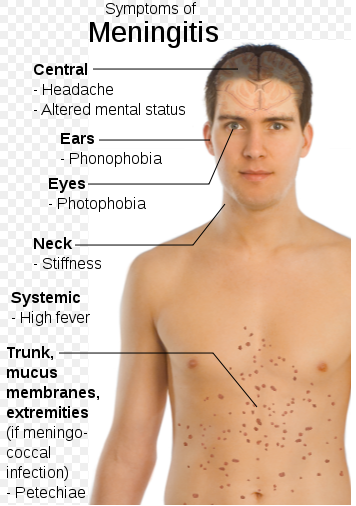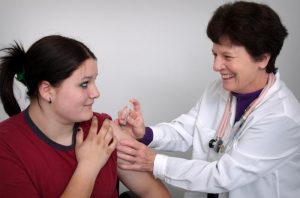Don’t wait until it threatens the life of someone you care about, learn what to look for and trust your instincts.
World Meningitis Day is celebrated on the 24th of April each year to raise awareness of the signs and symptoms of meningitis, the disease itself, and increasing knowledge of available vaccines.
What is Meningitis?
Meningitis is a potentially lethal disease that affects more than 1 million people worldwide each year. Meningitis is an infection that affects the delicate membranes — called meninges — that cover the brain and the spinal cord. Meningitis can be caused by different pathogens: fungal meningitis is rare and generally only occurs in people with weakened immune systems, whereas viral meningitis tends to be less severe and most people recover without specific therapy, while bacterial meningitis can be deadly and contagious among people in close contact. It is important to know the specific cause of meningitis because the treatment differs depending on the cause.

What are the symptoms of meningitis?
Meningitis is not always easy to recognize. In the early stages in young children and adolescents, the symptoms can be like a common cold. The classic signs of meningitis are a headache and stiff neck, and in babies — bulging fontanelle (soft spot on the head in babies), blank staring look and limpness. Sometimes the patient will have a rash that first looks like small blood spots then appears like larger bruises. Meningitis can develop rapidly over a few hours often leaving doctors little time for proper diagnosis and treatment.
Who is at risk of meningitis?
Meningitis can affect anyone at any age and cause death within 24 hours. Approximately half of bacterial meningitis cases occur in children under 5 years old and infants have a higher risk. A second meningococcal disease peak occurs in adolescents and young adults. The elderly (over the age of 65) have a high risk of dying from it. Adults and children with a weakened immune system and those who have skipped routine recommended vaccinations have a higher risk of infection.
What are the ways to prevent meningitis?
Stay healthy. Maintain your immune system by exercising regularly and eating a healthy diet. Also, be sure to get the sleep you need.
Practice good hygiene. Don’t share drinks, food, eating utensils, lip balms or toothbrushes with anyone. When you need to cough or sneeze, be sure to cover your mouth and nose.
Wash your hands. Careful and thorough hand-washing helps prevent the spread of germs. Teach children to wash their hands often, especially before eating and after using the toilet, spending time in crowded public places or petting animals.

Get vaccinated. Some forms of bacterial meningitis are preventable with the following: (1) Haemophilus influenzae type b (Hib) vaccine, (2) Pneumococcal vaccine, (3) Meningococcal conjugate vaccine. Getting vaccinated against measles, mumps, rubella, and chickenpox can help prevent diseases that can lead to viral meningitis. New vaccines are being developed to protect against other common causes of meningitis.
Don’t wait until it threatens the life of someone you care about. Learn what to look for and trust your instincts. Learn the symptoms to protect you and your loved ones. Act now and spread the word! Tell others about World Meningitis Day!
Dr Melvin Sanicas, vaccinologist and public health physician is a medical expert at Sanofi Pasteur, a consultant for the World Health Organization, and a contributor for the World Economic Forum.


One day I hope there will be an inclusion of Primary Amoebic meningoencephalis in these articles. When I was searching for what my granddaughter had and died from 7 years ago there was no mention of PAM as a form of meningitis. Apparently nothing has changed. Unlike the other forms it is very rare andt ithe death rate is 99 percent.
Hi Alice. I agree PAM is extremely fatal and important. The article talks about meningitis in general without mentioning specific pathogen. Naegleria fowleri infections are extremely rare. In the 10 years from 2006 to 2015, 37 infections were reported in the US.
You could save lives by sharing this. #24HourMeningitis
Thank you very much for this very informative post!
These are the real stories of real people who had experience meningitis or had one of their family members experience meningitis: http://www.voicesofmeningitis.org/meningitis-video-library.html
It is rare compared to other infectious diseases but if it happens, it is lethal or leaves you with a disability.
Meningitis is treatable if diagnosed early but diagnosis is not easy.
Meningitis affects people of all ages and can be deadly in a matter of hours.
Currently available vaccines can prevent most of the cases of bacterial meningitis.
Trust your instincts if you spot: fever, rash, vomiting, headache, stiff neck, sensitivity to light or drowsiness.
Definitely! Awareness is key to prevention!!!
Please spread the word about meningitis by sharing this!
These are some of the possible after effects of meningitis: deafness, limb loss, brain damage and seizures.
10-20% of patients with bacterial meningitis will die within 1 or 2 days!
Let’s spread the word as awareness is key to prevention! #24HourMeningitis
Tell others about World #Meningitis Day on 24th April and the symptoms that could save lives. #24HourMeningitis
Please share this so people will be aware about this rare but potentially fatal disease!